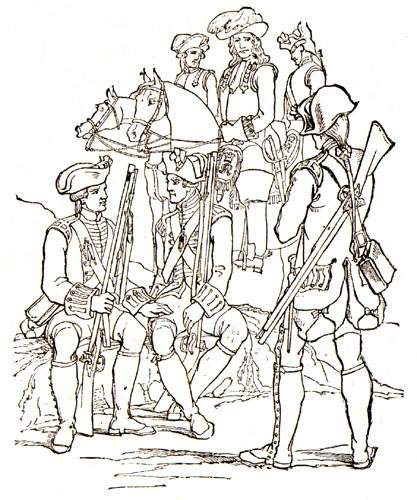Garrison Life in the 18th Century
Page 2
Factors Contributing to the Poor Quality of Soldiers
Sometimes, the quality of the soldiers was poor because they had served so long on the island that they had, quite literally, deteriorated physically. Thus, the detachment of the 59th Regiment had been in Newfoundland for nine years when it was relieved in 1774. The record for length of service surely belongs to the detachment of the 45th Regiment; when it was finally relieved in 1765, it had been serving in Newfoundland since the unit was formed in 1717- nearly 50 years. Not surprisingly, they were described as being "all Old Men" when they finally boarded ship for Ireland.
Such situations arose because the British army did not practice a regular system of rotation or relief, although many of the field officers urged their superiors to consider adopting some sort of rotation, especially in harsh environments such as Newfoundland. Captain Debbieg, the engineer surveying the defences of St. John's in 1766, explained that "It is no uncommon thing to behold Men that have only remained a few Years here, reduced to mere Ideots by Drink and Debauchery. When a Soldier sees no Prospect of being speedily relieved from such a Country as this, his Spirits become depressed and he flyes to Liquor to raise them, which soon grows into a habit, and the Man of course good for nothing." (Shelburne Papers, Vol.86, p.43)

Officers could request permission to return home to attend to their private affairs or for reasons of health. If all else failed, an officer could resign his commission, as Captain Stephen Gualy did in 1764, explaining that "I have gone out of the army for no other Reason Than to avoid the Rigor of the Winter here." (Gage Papers, AS, 2 July 1764) The rank-and-file soldiers were not so fortunate, for the period of enlistment commonly ran for a lifetime, or 21 years (whichever came first). For them, death, desertion, or alcoholic stupor were the only way to escape. Of these, desertion was perhaps the least serious problem in Newfoundland because, on an underpopulated island, there was no place to run. Some deserters tried to make their way to the mainland of North America on a trading vessel. Most, however, headed to one of the outports where there was no one in authority to arrest them, and where they might find shelter with a fisherman who could use cheap labour. Generally, the economic prospects were so bleak that deserters eventually returned to St. John's and gave themselves up.
A third factor contributing to the poor quality of the soldiers in Newfoundland was the harsh conditions, neglect, and abuse to which they were subjected. Right from the start, military service in Newfoundland was a life-threatening occupation. The first troops were sent to Newfoundland in 1697; of the 299 troops of all ranks who began the winter, 214 died before spring. According to the commanding officer, "the scarcity of provisions and the hard work during the summer [on the fortifications] cost most of the poor men their lives (CSP, Col. XVI, #1041)". Though conditions were never again quite so fatal, complaints about insufficient or inadequate bedding, clothing, fuel, and pay were constant throughout the 18th century. The firewood allowance was never sufficient for the harsh winters. Uniforms were replaced so infrequently that the soldiers rarely looked like soldiers. All the same, the cost of the uniforms, shoes, equipment, washing, and provisions was regularly deducted from the soldier's pay, whether or not he was ever issued them.




